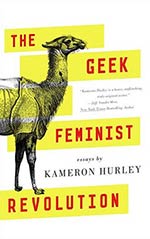
![]() illegible_scribble
illegible_scribble
6/24/2017
![]()
The Good, the Bad, and the Really, Really Ugly
Kameron Hurley's The Geek Feminist Revolution is a collection of essays, mostly from her blog, regarding various subjects which are interesting, important, or both:
Read as a whole, the essays tend to have spots of repetition which are more apparent than they would have been if read individually, as they were posted on a blog. However, this is a minor nitpick, and it looks to me as though Hurley made a successful effort at revisions which reduced redundancy without losing context.
And now we get to The Elephant In The Room.
My thanks to other readers who provided a heads-up about the Requires Hate apologism; because of that, I was at least not blindsided by it.
When Hurley was 18, she decided -- for various reasons she details in the essay -- to construct an online life through a faux persona. For around a year, she interacted with others in an online community as a confident, articulate male who was apparently well-liked and trusted enough to be invited to edit an early online spec fic magazine. But eventually she managed to escape the abusive relationship she was in, abandon the false persona, and move on with her life. And she admits to, early in her blogging life, having posted some extremely blunt reviews regarding books which exhibited what she calls "bullshit sexism".
She then makes an equivalency of what she did to the 10+year campaign of hatred, abuse, psychological manipulation, emotional extortion, and suicide-egging-on by Requires Hate / Winterfox / Benjanun Sriduangkaew under various pseudonyms in numerous internet communities, mostly against SFF writers from groups which are already badly discriminated-against, marginalized, and abused. That she makes this equivalency, of the mostly-harmless 1-year false persona she perpetrated, to a more-than-a-decade-long harassment campaign by an adult woman of immense wealth and privilege, is pretty shocking -- as well as utterly specious.
Hurley describes having read some of RH's reviews and eventually blocking RH on Twitter because she didn't feel the need to revel in someone else's mean-spiritedness. She also acknowledges that she once was the recipient of a vitriolic review by RH which she was pretty much able to shrug off as both making true points, and as not really affecting her -- a measure of her privilege as both a writer and a white person who was not brutally, repeatedly targeted by BS.
Hurley then admits to having an immense admiration for Sriduangkaew's writing -- so much so, that she had entered into an ongoing online conversation with BS. And eventually BS let slip a piece of information which made Hurley realize that RH and BS were the same person.
And then, this is the breathtakingly awful part of it, Hurley proceeds to trivialize and minimize RH's campaign of hatred against minority writers -- many of whom abandoned beloved internet communities, stopped writing stories, and even seriously contemplated committing suicide because of the abuse -- as "a woman who ranted angrily on the internet for the entertainment value of a few hundred people" and says "we make excuses for men". Which apparently justifies making excuses for RH, too.
Well.
This is all bad enough -- but then Hurley follows that essay with one in which she doubles-down about how her original essay was right and that not responding to it was the correct thing to do.
And -- this, to me, is the particularly reprehensible part of it, considering that Hurley spent several years in a relationship with a manipulative abuser and several more years recovering from it, and damn well ought to know better -- Hurley proceeds to pull out Grade-A manipulation against anyone who was horrified by her defense of RH by saying, "I received three apologies from people -- both online and privately -- who had posted initially knee-jerk misreadings of the post."
That's right. If you were upset or appalled by Hurley's apologism for BS, it was because you had a "knee-jerk" response and "misread" her post.
I have long been a fan of Hurley's writing, and I won't stop reading her fiction and nonfiction writing. But I have certainly revised my estimation of her, as an individual, downward. With all the essays in her book about privilege and marginalization, she decided to counter them with an apologism for a person of massive wealth and privilege who has horribly harassed and abused extremely marginalized individuals.
At this point, I honestly don't know where I am going to put Hurley's work on my Hugo ballot. Because in some ways it's better than the 3 other Related Works I've read thus far, and in some ways it's way worse. I don't feel that I can No Award it, but there is certainly no way that I can place it first on my ballot, either.